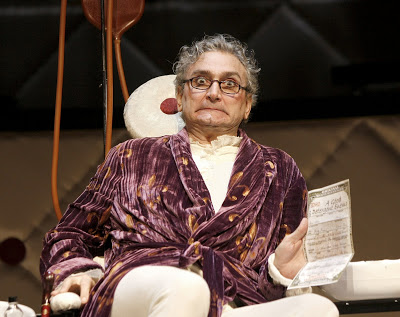 Rocco Sisto as Argan in Moliere’s comedy, The Imaginary
Rocco Sisto as Argan in Moliere’s comedy, The Imaginary
Invalid, directed by David Schweizer. (Photo: Chris Bennion)
It is amazing that this comedy, The Imaginary Invalid, is more than 450-years-old, originally written and produced by the possibly gay French playwright and actor Molière, who ironically was ill and died in 1673 during its run at the Palais Royal theatre in Paris. Playwright Constance Congdon has adeptly brought this classic comedy to the Seattle Rep Theatre.
Many of the original jokes in Molière’s 1673 The Imaginary Invalid would leave modern American audiences puzzled instead of laughing-especially if spoken in their native French! Happily, playwright Constance Congdon adapted the play with contemporary humor and style in mind. Most importantly for a comedy, she focused on keeping the fun flying.
While the portrayal of Argan, the imaginary invalid, by actor Rocco Sisto is not how I personally envision the character, it is a refreshing and uniquely humorous persona of the iconic hypochondriac. Kind of like an Alan Alda meets Robin Williams…but don’t get me wrong I mean that in a good way. Argan’s zany Doctor Purgeon, is played by local acting icon David Pichette (recognizable actor of Scrooge from A Christmas Carol at the ACT Theatre) and his nephew, Claude de Aria (sounds like diarrhea) whose over the top zaniness is the most memorable of the characters. Both neurotic and absurd, Claude refers to himself in the third person and is played wonderfully by Ian Bell, who is also happens to be producing director of theater at Rebar.
(L-R) Ian Bell as Claude De Aria, Rocco Sisto as Argan, Zoë Winters
as Angelique and Julie Briskman as Beline. (Photo: Chris Bennion).
The play centers entirely around Argan’s room which is fashioned with a brilliant white padded fabric covering everything, including the floor of the stage. The padded floors and walls are set on two large turntables that move independently of each other. Big kudos to both Riccardo Hernandez, the Scenic Designer, and David Woolard, the Costume Designer, who designed the costumes from the original production of The Who’s Tommy.
The humor really picks up in Act II with the introduction of Doctor Purgeon and his nephew Claude. Favorite performances come from the manic character Angelique, daughter to Argan played by Zoe Winters and Julie Briskman does an admirable job portraying the difficult part of Beline, Argan’s greedy second wife and step mom to Angelique. The play is held together by Toinette, Argan’s sarcastic and sassy maid-servant played by Alice Playten, who is certainly a professional on the stage appearing in over 10 Broadway musicals, but at times her lines felt a bit forced. One of my only complaints is the difficulty to follow parts of the play because of the boisterous deep laughter coming from the people that may be sitting around you.
 (L-R) Alice Playten as Toinette, Rocco Sisto as Argan
(L-R) Alice Playten as Toinette, Rocco Sisto as Argan
and Julie Briskman as Beline. (Photo: Chris Bennion)
In real life, the legend is that Molière, the play’s creator and considered one of the greatest masters of comedy in Western literature, died on stage from tuberculosis while playing the hypochondriac, Argan. Actually in a twist of tragic irony, the playwright Molière was wracked with coughing fits, but he did complete a final performance and passed away later at home with a talented young actor named Michael Baron by his side. Molière had taken Baron into his own home three years earlier much to the dismay of his own wife who forced him choose between Baron and her.
The Imaginary Invalid is an entertaining and surprisingly fun comedy with a professional feel and certainly worth your time and money. Tickets to The Imaginary Invalid range from just $15-$59. Anyone 25 and under may purchase tickets for only $10 for any performance (with ID – call for details) For ticket reservations call the Seattle Repertory Theatre box office at (206) 443-2222 or go online at www.seattlerep.org.
The Gala reception for the LGBT community will happen on Tuesday March 4, 2008. You must RSVP for this event and it will be held during the intermission of the play.














